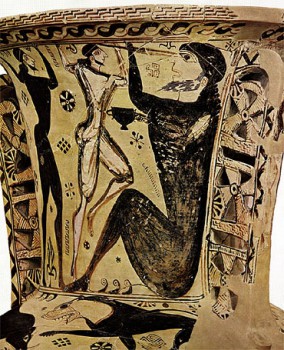Ancient Worlds: In the kingdom of the blind, the one-eyed man will still eat you for supper.
After Odysseus, famed warrior and inventor of the Trojan Horse (the original wooden one, not the one you can pick up from questionable internet sites), left behind the Island of the Lotus-Eaters, he sails on to a far more dangerous location: the Island of the Cyclops.

Cyclopses.
Cyclopes.
Whatever. The island where a bunch of one-eyed cannibalistic giants live.
Unfortunately for Odysseus and his men, they don’t realize that they’ve staggered out of a naval adventure movie and into a horror flick. All they know is that they arrive on shore, starving and desperate for shelter, and find a giant cave stocked with cheese, and only a complete monster would object to starving, desperate, lost travellers eating. Right?
They’re in for a shock when Polyphemus returns. He not only objects, he turns around and eats two of Odysseus’ crew members (thus proving that the Red Shirt trope is older than dirt). Odysseus objects to this, claiming that it is wrong to eat one’s guests. Or anyone, for that matter. Polyphemus responds that since Odysseus is his guest, he will give him the gift of eating him last.
 The Odyssey stands alongside Gilgamesh as perhaps the earliest Western examples of fantasy literature.
The Odyssey stands alongside Gilgamesh as perhaps the earliest Western examples of fantasy literature.  As one of the new recruits here at Black Gate, I’ll be bringing you a series of what I hope you’ll find to be interesting posts soon enough. But first I wanted to say howdy and tell you a little bit about myself.
As one of the new recruits here at Black Gate, I’ll be bringing you a series of what I hope you’ll find to be interesting posts soon enough. But first I wanted to say howdy and tell you a little bit about myself.